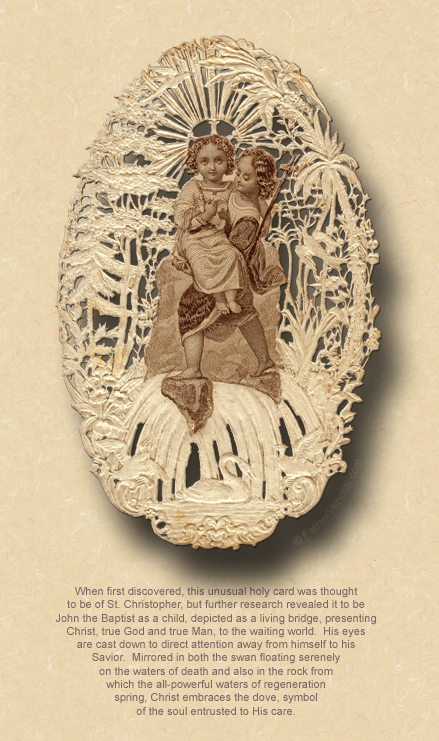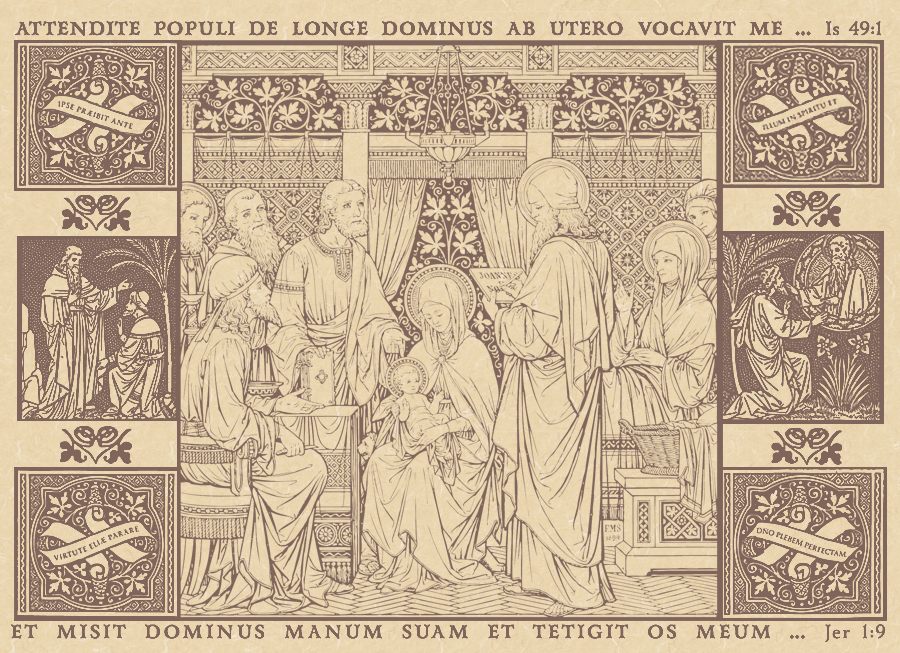Long Day's Journey into Night.
The Solemnity of the Nativity of John the Baptist.
Lessons from the proper, according to the ordinary form of the Roman Rite, for the vigil:
• Jeremiah 1: 4-10.
• Psalm 71: 1-6, 15, 17.
• I Peter 1: 8-12.
• Luke 1: 5-17.
…and for the feast:
• Isaiah 49: 1-6.
• Psalm 139: 1-3, 13-15.
• Acts 13: 22-26.
• Luke 1: 57-66, 80.
The First Class Feast of the Birthday of Saint John the Baptist.
Lessons from the proper, according to the extraordinary form of the Roman Rite, for the vigil:*
• Jeremiah 1: 4-10.
• [Gradual] John 1: 6-7.
• Luke 1: 5-17.
…and for the feast:
• Isaiah 49: 1-3, 5-7.
• [Gradual] Jeremiah 1: 5, 9.
• Luke 1: 57-68.
The Solemn Holy Day of the Birth of the Holy Prophet, Forerunner & Baptist, John.
Lessons from the menaion, according to the Ruthenian recension of the Byzantine Rite:
• Romans 13: 11—14: 4.
• Luke 1: 5-25, 57-68, 76, 80.
FatherVenditti.com
|
8:53 AM 6/24/2016 —
Apart from the most holy solemnity commemorating our Savior's birth, the Church keeps the birthday of no other person except that of John the Baptist. In the case of other saints or of God's chosen ones, the Church, as you know, solemnizes the day on which they were reborn to everlasting beatitude after ending the trials of this life and gloriously triumphing over the world. For all these the final day of their lives, the day on which they completed their earthly service, is honored. But for John the day of his birth, the day on which he began this mortal life, is likewise sacred. The reason for this is, of course, that the Lord willed to announce to Men His own coming through the Baptist, lest if He appeared suddenly, they would fail to recognize Him” (Sermon 20 on the Saints).
 And those words were preached by the Father of the Church, Saint Augustine, in the fourth century, explaining why Saint John the Baptist is the only saint on the calendar—apart from our Lord and our Lady—whose birthday is a feast. And those words were preached by the Father of the Church, Saint Augustine, in the fourth century, explaining why Saint John the Baptist is the only saint on the calendar—apart from our Lord and our Lady—whose birthday is a feast.
My family is one of those in which every child born has to be named after someone else: I was named after my father and my father was named after his father; my older sister was named after my mother, who was named after her mother; since I have no son of my own, my younger sister's son is named after me, and so forth. This custom was very strictly adheared to in the Palestine of our Lord's time, and figures prominently in the story of the birth of the Baptist.
And that story is very familiar to us: the Angel Gabriel sent to Zechariah; Zechariah doubting Gabriel's message and suffering the loss of his voice as a consequence; the birth of the Baptist by the once-thought-barren Elizabeth; the objections of their neighbors that none of their relatives has the name “John,” and the insistence of Zechariah that he be given that name anyway, after which his voice is restored by God. And today's Gospel lesson ends with the climactic statement that “…as the child grew, his spirit achieved strength, and he dwelt in the wilderness until the day when he was made manifest to Israel” (Luke 1: 80 Knox).
You wouldn't know it from the subtle way in which it is celebrated, but the feast of the Nativity of John the Baptist is one of the oldest feasts on the Christian calendar. In the Byzantine Church in which I used to serve, it's observed as an obligation day. Exactly when the Baptist was born is unknown, but the date for this feast was chosen in the fourth century because it is exactly six months before the date chosen for celebrating the birth of our Lord; and, Saint Augustine, at that time, remarked how appropriate it was that the date for this feast is so close to the summer solstice, since it's now that the daylight hours begin to grow shorter, whereas the celebration of our Lord's birth at Christmas occurs in the middle of winter, after which the days begin to grow longer, which he says is consistent with the remark made by John the Baptist in John's Gospel wherein, upon being told that Jesus has begun to baptize as he was, he says, “He must increase; I must decrease” (John 3: 30 NABRE), which, when you think about it, is the quintessential statement of the interior life for the Christian: our goal should be to reproduce in ourselves the life of Christ so perfectly that we ourselves begin to disappear and Christ begins to show through us in perfect purity.
That, of course, is an ideal rarely obtained except by the saints. Some of you, I'm sure, are familiar with the life of the Little Flower; her “little way,” as she called it, was really nothing more than this spiritual principle so simply and perfectly expressed by the Baptist in John's Gospel: “He must increase; I must decrease.” But, as I said, it's a rather lofty spiritual goal, and with all the pragmatic concerns we have to deal with every day—in our jobs, with our families, in the daily spiritual combat that is Christian living—it's very difficult to even think of achieving this lofty goal—unless of course, we're going to follow the lead of the Desert Fathers and retreat into a hermitage somewhere to live out our lives, but that is not the choice that any of us have made.
But there is a way that we can actually do this to a degree, and it was very simply and beautifully put by a saint canonized not too many years ago, whose feast we would celebrate on Sunday if his feast was celebrated in this country, which it isn't, and that's Saint Josemaría Escrivá. He said—and I've quoted this line to you several times—that, for those of us in the world, whether we be lay people or priests, it is enough to strive for the goal that, when others see us act or hear us speak, they would be able to say, “That person has read the life of Jesus Christ.”
On this ancient feast of the Nativity of Saint John the Baptist I would like to recommend—and particularly at the moment when we receive our Blessed Lord in Holy Communion—that we ask our Lord for the grace to decrease ourselves so that He may increase within us. The Responsorial Psalm today is actually the Confitébor tibi from Psalm 139, but does not include the last two verses of that psalm, which I would also like to recommend to you as the perfect prayer for the day:
Scrutinize me, O God, as thou wilt, and read my heart; put me to the test, and examine my restless thoughts. See if on any false paths my heart is set, and thyself lead me in the ways of old (v. 23-24 Knox).**

* In the Roman Rite, the concept of a vigil differs completely between the ordinary and extraordinary forms. In the ordinary form, a vigil is simply a celebration of the feast the evening before, either prior to or following First Vespers. On Solemnities on which an obligation has been attached, this may be fulfilled at either the Mass of the vigil or the feast. The vigil Mass may or may not have texts and lessons of its own, depending on the feast; if it does not, then the lessons of the feast are used.
In the extraordinary form, the word “vigil” designates the entire day before a First Class Feast, and the Mass on that day takes place in the morning. The vigil of a first class feast is a feria of the second class, and takes precedence over any third class feast that may fall on that day. The texts and lessons, while proper to the vigil, are always different from that of the feast itself, and no obligation is satisfied. If a feast carries an obligation, this must be satisfied on the feast itself; the extraordinary form does not offer the opportunity to satisfy an obligation on the evening before. Thus, the lessons indicated here for the Vigil of John the Baptist in the extraordinary form would not have been read last night, but at yesterday's morning Mass. They are listed here because there was no post yesterday.
** Msgr. Knox, following the numbering of the Greek Psalter, numbers this psalm 138 along with the Vulgate. The Roman Missal follows the numbering of the Hebrew Psalter.
|

